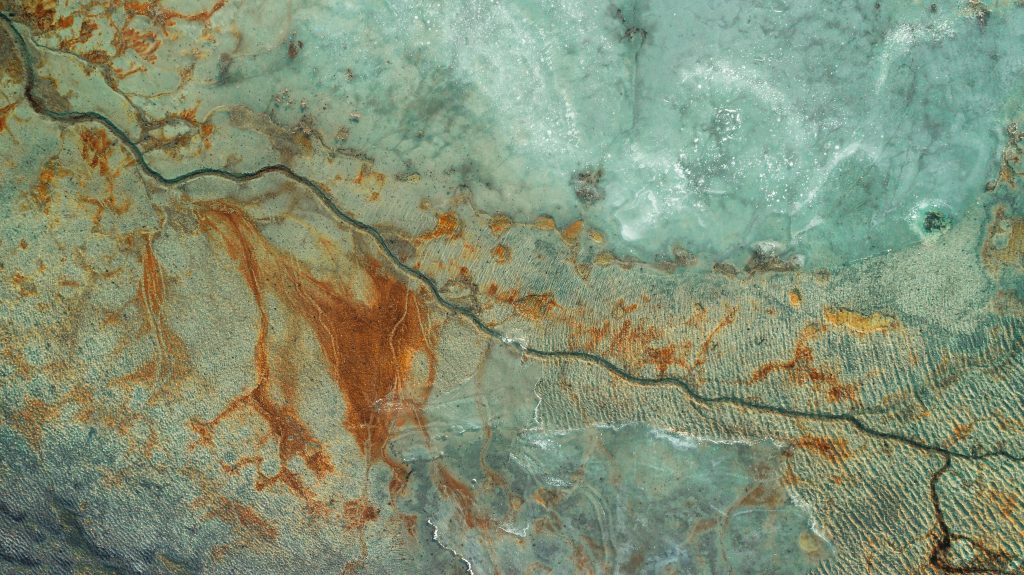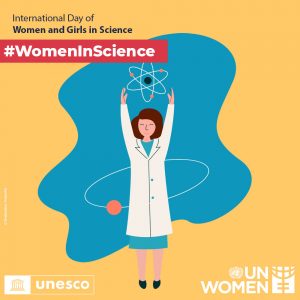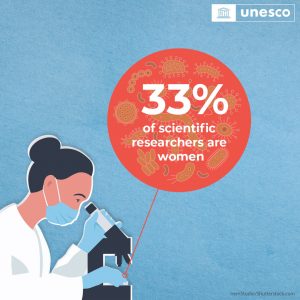
February 12, 2026

Implemented by UNESCO and UN-Women, the International Day of Women and Girls in Science (IDWGIS) is celebrated every year on 11 February. This day promotes women and girls in science, and it is also an opportunity to promote full and equal access to and participation in science for women and girls.
This year’s IDWGIS will center on the role of women and girls in science in relation to the Sustainable Development Goals (SDG). With this they aim to connect the International Community to Women and Girls in Science by strengthening ties between science, policy, and society for future-oriented strategies. As a result, the IDWGIS will highlight best practices, strategies, and applied solutions for addressing SDG challenges and opportunities.
At the research institute InnoRenew CoE they decided to take up upon this challenge and asked all of their 66 employees to share their thoughts in relation to the SDG’s and the role of diverse and balanced stuff they have.
Marica Mikuljan, researcher: “Through education, learning and cooperation.”
Jaka Pečnik, assistant researcher and PhD student: “Explore gardening, seek and learn for self food supply, look and learn for the support from local producers and respect your ecosystem.”
Dr. Rok Prislan, researcher: “Don’t eat your future!”
Mariem Zouari, assistant researcher and PhD student: “By implementing simple conscious habits, we can all contribute to reduce emissions and breath cleaner air.”
Mateja Erce, assistant researcher and PhD student: “Researchers can contribute understanding and guidelines on how to build a built environment that enhances well-being, meet the needs of all generations, and at the same time be sustainable.”
Kaja Kastelic, assistant researcher and PhD student: “How we allocate our time to movement behaviours impacts our health as well as planetary health.”
Dr. Andreja Kutnar, director and researcher: “I fell in love with wood as a little girl and wanted to understand it, which lead me to become wood scientist.”
Vesna Starman, assistant researcher and PhD student: “Only through quality education can we achieve inclusion, which is a prerequisite for sustainable development. “
Dr. Matthew Schwarzkopf, research group leader: “Working in a diverse workspace that supports lifelong learning with opportunities for training and independent research empowers us all.”
Marica Mikuljan, researcher: “A woman’s role in society depends on her upbringing – in the family, in kindergarten, at school, at college. Things don’t happen overnight. By raising awareness and setting a good example, the next generation of women will be more confident and successful.”
Marica Mikuljan, researcher: “Water is a vital commodity and belongs to all living beings. It should not be owned by individuals. Research on sustainable water management, availability and sanitation should be funded by governments and the results of research and development should be freely available to all people on earth. Together, we would find a solution that would make life easier for many living beings.”
Marica Mikuljan, researcher: “Energy equals water. The energy of the earth and the sun belongs to all people.”
Dr. Dean Lipovac, researcher: “Providing the world with clean and abundant energy is at the heart of everything we do to improve lives of people.”
Dr. Ana Slavec, researcher: “Protecting the environment does not have to come at the expense of quality of life and economic development. We researchers are studying ways to promote innovation that also has environmental benefits and contribute to sustainable development.”
Urban Kavka, assistant researcher: “We as InnoRenew are collaborating with partners from variety of countries, however it is important to always strive for wider network and consequently wider outreach.”
Urban Kavka, assistant researcher: “To make our living environment more inclusive, safe, resilient and sustainable, it is important to educate wider public and empower them to shape future cities. At InnoRenew CoE we are creating trainings and educational programme which is a step towards this.”
Dr. Anna Sandak, research group leader: “We’re still thinking that someone else will solve our planet’s problems. It doesn’t work like this. We need to all care more, buy less, save more, use smart, and choose well.”
Nežka Sajinčič, assistant researcher and PhD student: “Sustainability is not just about conserving our resources for future generations, but about creating a better world for all of us today.”
Dr. Karen Butina Ogorelec, researcher: “It is our responsibility, as researchers, to find ways to combat climate change. And it is our responsibility, as a society, to implement them.”
Dr. Daša Majcen, researcher: “We are approaching the point of no return in relation to ecosystem degradation, let us finally grasp its crucial role and transform the society to protect nature!”
Urban Kavka, assistant researcher: “A huge step to achieve peaceful, inclusive and just institution is to give voice to everyone involved. Promoting good quality and non-violent communication is key for successful social sustainability.”
For the reminder, InnoRenew CoE is committed to having diversity in research staff, including gender equality. Among the institute’s 65 employees, 48 percent are women. In the study year 2022/2023, 19 InnoRenew CoE employees are enrolled in doctoral studies. Fifty three percent of these students are women from various fields—renewable materials for healthy built environments, kinesiology, pedagogy, chemistry and computer science, which is surely encouraging data for the future of science. InnoRenew CoE is continuing to integrate the gender dimension into the institute’s research, based on the Gender Equality Plan, which was completed and adopted in 2021.
Furthermore, the work at InnoRenew CoE is founded on interdisciplinarity and integration in a scientific and international context. As a result, research at the institute is very diverse. About half of the institute’s employees are Slovenian, and the rest are from all over the world, not just Europe. Employees currently come from 21 different countries, including Hungary, India, Italy, Mexico, Norway, Pakistan, Poland, Slovenia, Spain, Sweden, Thailand, Tunisia, and the United States.

